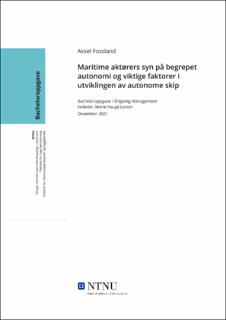| dc.contributor.advisor | Larsen, Marie Haugli | |
| dc.contributor.author | Fossland, Aksel | |
| dc.date.accessioned | 2022-02-09T18:19:24Z | |
| dc.date.available | 2022-02-09T18:19:24Z | |
| dc.date.issued | 2021 | |
| dc.identifier | no.ntnu:inspera:100185197:46841655 | |
| dc.identifier.uri | https://hdl.handle.net/11250/2978086 | |
| dc.description.abstract | Bakgrunn: Autonome skip er et teknologisk område under utvikling, og det finnes lite informasjon om synspunktet til maritime aktører som jobber mot autonome skip.
Formål: Studiets formål er å undersøke hva maritime aktører mener om autonomi og utviklingen av autonome skip. Hensikten er å bidra til økt forståelse av maritime aktørers perspektiv om utviklingen av autonome fartøy.
Problemstilling: Hvordan opplever aktører i maritim industri begrepet autonomi, og hvilke faktorer kan være viktige i utviklingen av autonome skip?
Teori: Det er benyttet teori knyttet til teknologisk modenhet, ulike oppfatninger og begreper av autonomi, og endringsteori i organisasjoner.
Metode: Det er benyttet kvalitativ metode ved bruk av semi-strukturerte dybdeintervju. Studiets utvalg består av tre representanter fra ulike store maritime aktører, deriblant DNV og Sjøfartsdirektoratet. En stegvis-deduktiv induktiv metode benyttes for analyseringen av transkriberte intervjuer for å komme fram til resultatene.
Resultater: Funnene i studiet tyder til at hos de intervjuede aktørene er det et synspunkt om at autonomi bør sees på funksjonsnivå. Viktige faktorer for utviklingen mot autonome fartøy er standardisering, systemforståelse og prosjektsamarbeid.
Konklusjon: De maritime aktørene ser på autonom drift som spesifikk for en funksjon, og ikke som en betegnelse for et helt fartøy. Standardiseringsarbeid er viktig for å øke kompetansen og gjøre et område med høy kompleksitet enklere å forholde seg til. Systemforståelse trengs for å kunne utvikle og bygge verktøy som kan støtte en operasjon. Prosjektsamarbeid er viktig for å sikre en bedre endringsprosess. | |
| dc.description.abstract | Background: Autonomous ships are a technological area under development, and there is little information about the views of maritime actors working towards autonomous ships.
Purpose: The purpose of the study is to investigate what maritime actors think about autonomy and the development of autonomous ships. The purpose is to contribute to a greater understanding of the maritime actors' perspective on the development of autonomous vessels.
Issue: How do actors in the maritime industry experience the concept of autonomy, and what factors may be important in the development of autonomous ships?
Theory: Theory related to technological maturity, different perceptions and concepts of autonomy, and theory of change in organizations has been used.
Method: A qualitative method has been used through semi-structured in-depth interviews. The study selection consists of three representatives from various major maritime actors, including DNV and the Norwegian Maritime Directorate. A step-by-step inductive method is used for the analysis of transcribed interviews to arrive at the results.
Results: The findings of the study indicate that among the interviewed actors there is a view that autonomy should be seen at the functional level. Important factors for the development towards autonomous vessels are standardization, system understanding and project collaboration.
Conclusion: The maritime players see autonomous operation as specific to a function, and not as a designation for an entire vessel. Standardization work is important to increase competence and make an area with high complexity easier to deal with. System understanding is needed to be able to develop and build tools that can support an operation. Project collaboration is important to ensure a better change process. | |
| dc.language | nob | |
| dc.publisher | NTNU | |
| dc.title | Maritime aktørers syn på begrepet autonomi og viktige faktorer i utviklingen av autonome skip | |
| dc.type | Bachelor thesis | |
